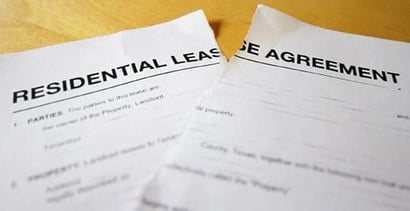

When you sign a lease, you are signing a legally binding contract with your landlord.
Your end of the bargain is that you agree to make all the rent payments over the course of the lease.
Things change though and may need to move out earlier than expected, meaning you’ll want to break the lease and not make all the payments.
You need to handle this process carefully, especially if you have bad credit, to make sure things go smoothly and your credit score doesn’t take any more damage.
1. Give your landlord as much warning as possible.
When you break your lease, you put your landlord in a tough situation. Suddenly, your landlord will need to find a new tenant which takes time and money.
If you give as much warning as possible, it will help make the process less stressful. As a result, your landlord will be more willing to work with you towards ending the lease on favorable terms.
2. Accept you will probably take a financial hit.
Breaking a lease means you are not holding up your end up a contract.
If you have left a security deposit, the landlord may keep some or all that money to make up the cost of re-renting the property.
If you don’t have a deposit, the landlord may request an extra month or two of rent payments as compensation for the broken lease.
“Expect to pay a penalty
for any extra trouble.”
3. Don’t skip out on your agreement.
As you get ready to move, it might be tempting to just leave and not settle the situation with your landlord, especially if you haven’t made a security deposit.
This can lead to serious financial trouble down the road though. If you don’t settle the contract with your landlord, he or she can file a lawsuit against you demanding payment for the unpaid rent.
If you leave this unresolved, it will eventually show up as a lost judgment on your credit score which will make it very hard to borrow money or rent a new apartment later on.
4. Help your landlord with the transfer.
You should work hard throughout this process to help your landlord and end on good terms. You should make your property available for tours, be reasonable in negotiating a penalty for breaking the lease and see if you can find another tenant yourself.
This extra work will pay off, especially if you have bad credit. Your bad credit score will make it harder to find a new apartment.
Ideally, your old landlord will be happy with you and will be willing to vouch for your good behavior with your new landlord. If you end on bad terms though, you won’t have this helpful character reference.
Breaking a lease is never a fun process, but by following these steps at least you’ll end on the best possible terms for your credit score and for finding your next home.
Photo source: oneluxuryapartments.com
Advertiser Disclosure
BadCredit.org is a free online resource that offers valuable content and comparison services to users. To keep this resource 100% free for users, we receive advertising compensation from the financial products listed on this page. Along with key review factors, this compensation may impact how and where products appear on the page (including, for example, the order in which they appear). BadCredit.org does not include listings for all financial products.
Our Editorial Review Policy
Our site is committed to publishing independent, accurate content guided by strict editorial guidelines. Before articles and reviews are published on our site, they undergo a thorough review process performed by a team of independent editors and subject-matter experts to ensure the content’s accuracy, timeliness, and impartiality. Our editorial team is separate and independent of our site’s advertisers, and the opinions they express on our site are their own. To read more about our team members and their editorial backgrounds, please visit our site’s About page.




